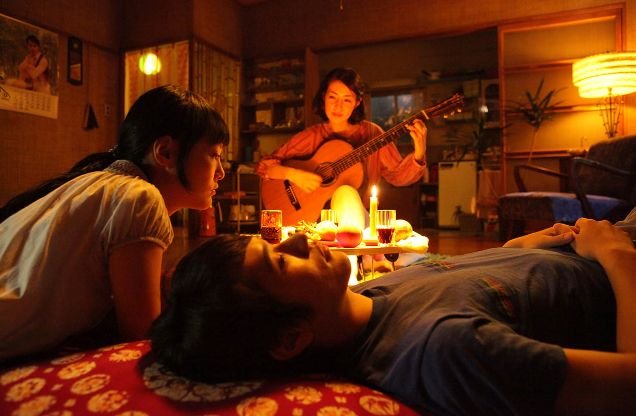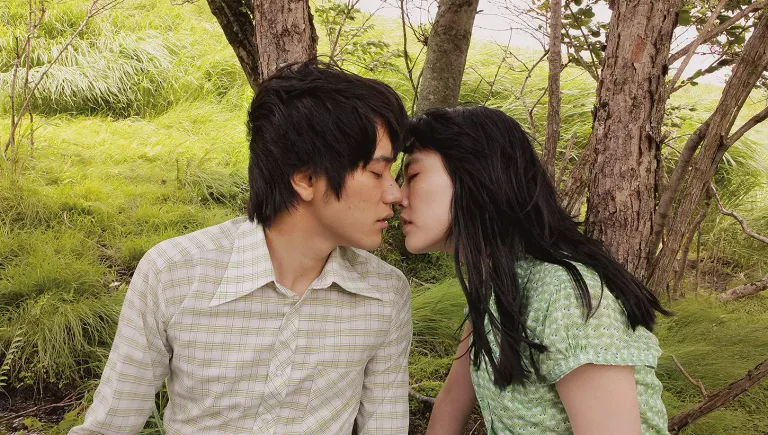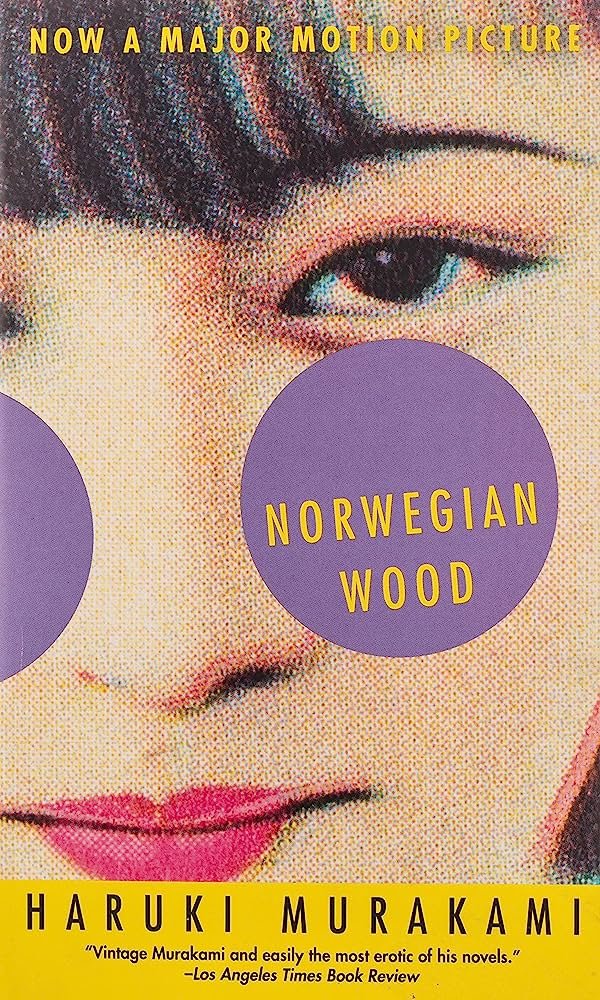Norwegian Wood (2010): a depressing love story | una historia de amor deprimente

Basada en la novela de Haruki Murakami
Haruki Murakami is one of the most celebrated Japanese writers in the world. Eternal candidate for the Nobel Prize, the author went from being a cult and little-known writer to being a global phenomenon thanks to novels such as The Wind-Up Bird Chronicle, 1Q84 and Kafka on the Shore. Some of his works have been successfully adapted to film in recent years; such is the case of Burning and Drive My Car, very good films based on stories by the writer.
Haruki Murakami es uno de los escritores japoneses más celebrados en el mundo. Eterno candidato al Premio Nobel, el autor pasó de ser un escritor de culto y poco conocido a ser un fenómeno mundial gracias a novelas como Crónica del pájaro que da cuerda al mundo, 1Q84 y Kafka en la orilla. Algunos de sus trabajos han sido adaptados exitosamente al cine en los últimos años; tal es el caso de Burning y Drive My Car, muy buenas películas basadas en cuentos del escritor.
But long before, in 2010, Vietnamese director Tran Anh Hung wrote the script and directed the film version of Murakami's novel Tokio Blues (Norwegian Wood), a love story that meant international validation for the writer and the jump to big sales when he published it at the end of the eighties. If you don't know the name Tran Anh Hung, I recommend you watch The Scent of the Green Papaya, a beautiful film from the nineties. Having that only reference from the director and having read Murakami's novel a couple of times, I decided to finally see its adaptation to the big screen. It is true that usually the movie is not as good as the book (with a few exceptions), but in general terms I think that in the case of Noruwei no Mori (Norwegian Wood) the film version is a bit lacking partly because the novel has some flaws. I know that it is very bold to talk about failures when dealing with a writer of Murakami's stature, but I think that although as an adaptation the film could have been better, it could not have done much more due to the original story and the characters built by the Japanese writer. . It may also be because I haven't been connecting with Murakami's stories lately like I did a few years ago, so I keep going back through some of his books to figure out what's changed.
Pero mucho antes, en el año 2010, el director vietnamita Tran Anh Hung, escribió el guión y dirigió la versión cinematográfica de la novela Tokio Blues (Norwegian Wood) de Murakami, una historia de amor que significó para el escritor la validación internacional y el salto a grandes ventas cuando la publicó a finales de la década de los ochenta. Si no conoces el nombre de Tran Anh Hung te recomiendo que veas The Scent of the Green Papaya, una hermosa película de los años noventa. Teniendo ese único referente del director y habiendo leído la novela de Murakami un par de veces, me decidí a ver por fin su adaptación a la pantalla grande. Es cierto que normalmente la película no es tan buena como el libro (salvo algunas pocas excepciones), pero en términos generales creo que en el caso de Noruwei no Mori (Norwegian Wood) la versión cinematográfica es un poco deficiente en parte debido a que la novela tiene algunas fallas. Sé que es muy atrevido hablar de fallas tratándose de un escritor de la talla de Murakami, pero creo que si bien como adaptación la película pudo ser mejor, tampoco podría haber hecho mucho más debido a la histora original y a los personajes construidos por el escritor japonés. También puede deberse a que últimamente no conecto con las historias de Murakami como lo hice hace algunos años, por eso sigo repasando algunos de sus libros para descubrir qué fue lo que cambió.

The film begins in Tokyo in the sixties with three teenagers who are always together, two of whom have a romantic relationship, Naoko and Kizuki. The third member, Toru Watanabe, is the protagonist of the story and the narrator of the novel, so we see everything through his eyes, which conditions the approach a little and leaves us with the limitation of not being able to know the same things he ignores. On the other hand, since it's a book written in the first person, it's normal that many of its musings have been brought to the screen using voice-overs.
La película inicia en el Tokio de los años sesenta con tres adolescentes que están siempre juntos, dos de los cuales tienen una relación amorosa, Naoko y Kizuki. El tercer integrante, Toru Watanabe, es el protagonista de la historia y el narrador de la novela, así que todo lo vemos a través de sus ojos, lo que condiciona un poco el enfoque y nos deja con la limitante de no poder saber lo mismo que él ignora. Por otro lado, al tratarse de un libro escrito en primera persona, es normal que muchas de sus elucubraciones hayan sido llevadas a la pantalla empleando voces en off.
A few minutes into the story, Kizuki commits suicide, and this means the separation of the other parts of the trio who only meet again some time later, already in college. So, a little to accompany each other in grief, to recover a little of the lost dynamic, or for some other reason, Toru and Naoko begin to spend time together and a spark of romance arises between them, is it okay to love your dead friend's ex-girlfriend? Does Naoko really love Toru or does she just see him as an extension of her truncated relationship with Kizuki? Doubts arise especially because Naoko is an emotional and mentally unstable young woman, not only as a result of Kizuki's suicide but also due to a past that is not explained as well in the film as in the book. From there the film progresses with meetings and separations between Naoko and Toru and with the experiences of the latter with his friend Nagasawa and the irreverent Midori, a female character who becomes the counterpoint of Naoko and Toru's other romantic interest who However, he cannot love her fully because he feels in love with his friend's ex-girlfriend. Comparing what was written with what was projected, I think Midori is the best adapted character, and perhaps Toru's (although he is a protagonist without much charm), but I didn't really like the film version of Naoko or that of her friend Reiko.
A los pocos minutos de comenzada la historia, Kisuki se suicida, y ello significa la separación de las otras partes del trío que sólo vuelven a encontrarse tiempo después, ya en época universitaria. Entonces, un poco por acompañarse en el duelo, por recuperar un poco de la dinámica perdida, o por alguna otra razón, Toru y Naoko comienzan a pasar tiempo juntos y surge entre ellos una chispa de romance, ¿está bien amar a la ex novia de tu amigo muerto? ¿en realidad Naoko ama a Toru o sólo lo ve como una extensión de su relación truncada con Kisuki? Surgen las dudas sobre todo porque Naoko es una joven emocinal y mentalmente inestable, no sólo a consecuencia del suicidio de Kizuki sino también a un pasado que en la película no se explica tan bien como en el libro. A partir de allí la película avanza con encuentros y desencuentros entre Naoko y Toru y con las vivencias de este último junto a su amigo Nagasawa y la irreverente Midori, personaje femenino que viene a ser el contrapunto de Naoko y el otro interés romántico de Toru quien sin embargo no puede quererla plenamente porque se siente enamorado de la ex novia de su amigo. Comparando lo escrito con lo proyectado, creo que Midori es el personaje mejor adaptado, y tal vez el de Toru (aunque es un protagonista sin mucho encanto), pero no me gustó mucho la versión cinematográfica de Naoko ni la de su amiga Reiko.

That said, I think one of the main flaws in the film is that it seems to assume that everyone who sees it has read the novel first, which is why there are scenes or some secondary characters that only those of us who have read Tokio Blues can recognize. A film adaptation should be accessible to everyone, whether or not they have read the book, so if things are going to be left unexplained, over-understood or under-developed, I think it is better not to introduce them in the script. Now, if the film is melancholic and quite depressive, it is entirely Murakami's responsibility; I would even say that the novel is more depressing, sadder and more tragic than its film version. Yes, of course there are memorable scenes, some phrases and certain moments with some laughter and romance, but I have read few books in which melancholy and suicides abound so much. The Suicide Club could almost be considered a subtitle for the novel. So I would not recommend watching this movie (there are many better options) neither for those who want to discover Tran Anh Hung (better watch The Scent of the Green Papaya) nor for those who want to see something by Murakami in the cinema (I already recommended two very good ones films based on Japanese stories); Maybe if you want to read something of his, Tokio Blues could be a good way to introduce yourself to his work, but I would better recommend Sputnik, Sweetheart or the stories of Blind Willow, Sleeping Woman, what about you? Have you read anything by Murakami? Have you seen any film adaptation of his works? I read you in the comments.
Dicho esto, creo que una de las fallas principales en la película es que pareciera dar por sentado que todos quienes la ven han leído la novela primero, por eso hay escenas o algunos personajes secundarios que sólo quienes hemos leído Tokio Blues podemos reconocer. Una adaptación al cine debería ser accesible para todos, hayan o no leído el libro, así que si van a quedar cosas sin explicar, sobre entendidas o poco desarrolladas, creo que es mejor no introducirlas en el guión. Ahora bien, si la película resulta melancólica y bastante depresiva, es responsabilidad entera de Murakami, incluso diría que la novela es más deprimente, más triste y más trágica que su versión cinematográfica. Sí, por supuesto que hay escenas memorables, algunas frases y ciertos instantes con algo de risas y romance, pero pocos libros he leído en los que abunden tanto la melancolía y los suicidios. Casi podría considerarse El Club de los Suicidas como un subtítulo para la novela. Así que no recomendaría ver esta película (hay muchas opciones mejores) ni para quienes deseen descubrir a Tran Anh Hung (mejor vean The Scent of the Green Papaya) ni para quienes quieran ver algo de Murakami en el cine (ya les recomendé dos muy buenas películas basadas en relatos del japonés); quizás si quieren leer algo suyo, Tokio Blues pueda ser una buena forma de introducirse a su obra, pero recomendaría mejor Sputnik, mi amor o los cuentos de Sauce Ciego, Mujer Dormida, ¿y ustedes? ¿han leído algo de Murakami? ¿han visto alguna adaptación cinematográfica de sus obras? Los leo en los comentarios.
Reviewed by | Reseñado por @cristiancaicedo
Other posts that may interest you | Otros posts que pueden interesarte:
 |
|---|



This seems good, but I am reluctant because I am thinking that it is just going to make me stressed.
Murakami es uno de mis escritores favoritos, estaré pendiente de la película que nos dejas hoy. Gracias por esta reseña estimado @cristiancaicedo. Un fuerte abrazo desde Maracay.
Uuh I only read the book but I bet I must watch the movie too, looks cool 😎